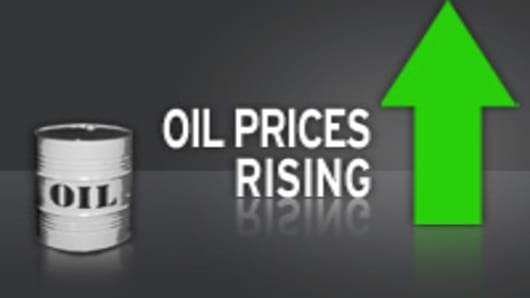You'd expect oil prices to take a bit of a breather after yesterday's record-breaking run that took NYMEX crude oil futures to an all-time high of $103.95/barrel intraday, surpassing the inflation-adjusted record reached more than a quarter century ago.
Yet today the market has been holding fairly steady, with some light profit-taking here and there, still prices oil holding steady ABOVE $100/barrel. Blame this record on the hedge funds once again. IT'S THE FUNDS, NOT FUNDAMENTAL DICTATING THE PRICE AGAIN IN THE ENERGY MARKETS THESE DAYS.
The dollar is a major factor. As Greg Anderson, a currency strategist points out in today's Wall Street Journal, the price of oil and the euro's exchange rate against the dollar have moved in the same direction about 96 percent of the time from the start of 2007 until now. And traders are betting on this trend continuing.
Tradition Energy's director of research Addison Armstrong says: "The weakness of the dollar has drawn funds to the commodity markets at full speed." The latest data from the CFTC's Commitment of Traders report shows hedge funds and other large speculators bought more than $3 billion worth of crude oil in the last week bringing their total exposure to $9.2 billion. Meanwhile, these funds have increased their net long position by more than 50 percent, the biggest rise since the beginning of January.
At the same time oil prices have soared from a low around $86 in early February to nearly $104 a month later. NYMEX RBOB gasoline and heating oil futures are at record levels. And the "golden moment" for precious metals continues, too as gold, silver and platinum climb to new heights.
How can oil prices continue to climb when tomorrow's weekly report on U.S. crude supplies is expected to show oil supplies increased for the eighth week in a row and gasoline supplies are at their highest level since 1994?
The answer: OPEC will probably do nothing, for now. The cartel knows these prices aren't based on fundamentals. They've been blaming the "speculators" for high prices throughout oil's bull run. The White House has urged OPEC members to increase supply, but they don't listen to Secretary Bodman or President Bush.
Members have been know to "zig" when you expect them to "zag." But this time it's a difficult and delicate balancing act. Add supply try to keep a lid on prices when gasoline demand is slowing and the U.S. economy is faltering? That could make the economic picture even worse. Cut supply now and risk sending prices even higher? Or do nothing.
OPEC president Chakib Khelil, Algeria's oil minister, has said there will be "no change" to output. Most traders and analysts that I talk to agree. But we could still see a battle break out, says Citi energy analyst Tim Evans, "with arguments over whether a rollover is bullish (because it fails to cap prices!) or bearish (it leaves a big second quarter supply/demand surplus!) as orders fly." The order flow of trading activity more than the logic may dictate price action, he says. Once again, it's the FUNDS, not FUNDAMENTALS in control right now.
Questions? Comments? energysource@cnbc.com



